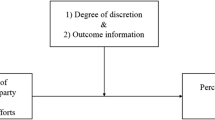Abstract
Arbitration is usually described as a semi-judicial, evaluative process, where the parties to a dispute surrender their responsibility for its resolution to a disinterested third party. The arbitrator is expected to listen impartially to the arguments of both sides and, on the basis of the evidence put forward, decide the issue between them. This paper questions the validity of the typical image of arbitration and suggests that a more comprehensive understanding can be developed if it is viewed in the context of different models of negotiation. It is argued that the arbitrator is likely to have at least two contrasting roles: (1) that of manager of the process of concession-convergence, when the issues in dispute are relatively straightforward; and (2) that of joint negotiator with the parties, constructing a framework for a future detailed resolution of the dispute, when the issues are more complex. The parties, on the other hand, are likely to be differentiated according to their previous experience of arbitration. While the more experienced participants may be able to make skilful strategic use of the procedures, the inexperienced are likely to be adversely affected by the evaluative/judicial public image of arbitration.
Similar content being viewed by others
References
Alexander, C.N. & Weil, H.G. (1969). Players, persons and purposes: situational meaning and the prisoner’s dilemma game. Sociometry, 32, 112–144.
Amulree, Lord G.B.E. (1929). Industrial Arbitration in Great Britain. London: Oxford University Press.
Anthony, P.D. (1977). The Conduct of Industrial Relations. London: Institute of Personnel Management.
Anthony, P. D. & Crichton, A. (1969). Industrial Relations and the Personnel Specialist. London: Batsford.
Balke, W.M., Hammond, K.R. & Meyer, G.D. (1973). An alternative approach to labor-management relations. Administrative Science Quarterly, 18, 311–327.
Batstone, E., Boraston, I. & Frenkel, S. (1978). Shop Stewards in Action: The Organisation of Workplace Conflict and Accommodation. Oxford: Blackwell.
Bigoness, W.J. (1976). Effect of locus of control and style of third-party intervention upon bargaining behavior. Journal of Applied Psychology, 61, 305–312.
Billig, M. (1976). Social Psychology and Intergroup Relations. London: Academic Press.
Clegg, H.A. (1979). The Changing System of Industrial Relations in Great Britain. Oxford: Blackwell.
Cross, J.G. (1977). Negotiation as a Learning Process. In I.W. Zartman (ed.), The Negotiation Process. Beverley Hills, CA: Sage.
Deutsch, M. (1973). The Resolution of Conflict: Constructive and Destructive Processes. New Haven, CT: Yale University Press.
Douglas, A. (1962). Industrial Peacemaking. New York: Columbia University Press.
Druckman, D. (1977). Boundary Role Conflict. In I.W. Zartman (ed.), The Negotiation Process. Beverley Hills, CA: Sage.
Egan, W. & Loveridge, R. (1982). A Theory and Technique of Negotiating and Bargaining. Unpublished dissertation, University of Aston in Birmingham.
Fleming, R.W. (1965). The Labor Arbitration Process. Urbana: University of Illinois Press.
Geen, R.G. & Gange, J.J. (1977). Drive theory of social facilitation: twelve years of theory and research. Psychological Bulletin, 84(6), 1267–1288.
Guillebaud, C.W. (1970). The Role of the Arbitrator in Industrial Wage Disputes. London: James Nisbet.
Hyman, R. (1972a). Disputes Procedure in Action: A Study of the Disputes Procedure in Coventry. London: Heinemann.
Hyman, R. (1972b). Strikes. London: Fontana.
Hyman, R. and Brough, I. (1975). Social Values and Industrial Relations. Oxford: Blackwell.
Jenkins, C. & Sherman, B. (1977). Collective Bargaining. London: Routledge & Kegan Paul.
Johnson, D.F. & Pruitt, D.G. (1972). Preintervention effects of mediation versus arbitration. Journal of Applied Psychology, 56, 1–10.
Johnson, D.F. & Tullar, W.L. (1972). Style of third-party intervention, face-saving and bargaining behavior. Journal of Experimental Social Psychology, 8, 319–330.
Lockwood, D. (1955). Arbitration and industrial conflict. British Journal of Sociology, 6, 335–347.
Lockyer, J.V.B. (1979). Industrial Arbitration in Great Britain. London: Institute of Personnel Management.
Magenau, J.M. & Pruitt, D.G. (1979). The Social Psychology of Bargaining. In G.M. Stephenson & C.J. Brotherton (eds.), Industrial Relations: A Social Psychological Approach. Chichester: Wiley.
Midgaard, K. & Underdal, A. (1977). Multiparty Conferences. In D. Druckman (ed.), Negotiations: Social Psychological Perspectives. Beverley Hills, CA: Sage.
Morley, I.E. (1979). Behavioural Studies of Industrial Bargaining. In G.M. Stephenson & C.J. Brotherton (eds.), Industrial Relations: A Social Psychological Approach. Chichester: Wiley.
Morley, I.E. (1980). Negotiation and Bargaining. In M. Argyle (ed.), Handbook of Social Skills. Volume 2. London: Methuen.
Morley, I.E. (1981). Bargaining and Negotiation. In C.L. Cooper (ed.), Psychology and Management: A Text for Managers and Trade Unionists. London: British Psychological Society and Macmillan Press.
Morley, I.E. & Stephenson, G.M. (1977). The Social Psychology of Bargaining. London: George Allen & Unwin.
Moscovici, S. (1972). Society and Theory in Social Psychology. In J. Israel and H. Tajfel (eds.), The Context of Social Psychology: A Critical Assessment. London: Academic Press.
Rackham, N. & Carlisle, J. (1978a). The effective negotiator — part I. Journal of European Industrial Training, 2, 2–5.
Rackham, N. & Carlisle, J. (1978b). The effective negotiator — part II. Journal of European Industrial Training, 2, 6–11.
Snyder, G.H. & Diesing, P. (1977). Conflict Among Nations: Bargaining, Decision-Making and System Structure in International Crises. Princeton, NJ: Princeton University Press.
Stephenson, G.M. & Webb, J. (1982). A Simulation Study of Third Parties in Industrial Decision-Making. In H. Brandstatter, J.H. Davis & G. Stocker-Kreichgauer (eds.), Group Decision Making. London: Academic Press.
Thibaut, J.T. & Walker, F. (1975). Procedural Justice: A Psychological Analysis. Chichester: Wiley.
Walker, K.F. (1970). Australian Industrial Relations Systems. Cambridge, MA: Harvard University Press.
Walton, R.E. & McKersie, R.B. (1965). A Behavioral Theory of Labor Negotiations: An Analysis of a Social Interaction System. New York: McGraw-Hill.
Wight-Bakke, E. & Kerr, C. (eds.) (1948). Unions, Management and The Public. New York: McGraw-Hill.
Winham, G.R. (1977). Complexity in International Negotiation. In D. Druckman (ed.), Negotiations: Social Psychological Perspectives. Beverley Hills, CA: Sage.
Winham, G.R. & Bovis, H.E. (1978). Agreement and breakdown in negotiation: report on a state department training simulation. Journal of Peace Research, 15, 285–303.
Wood, J. (1977). Annual Report of the Central Arbitration Committee. London: HMSO.
Zajonc, R.B. (1965). Social facilitation. Science, 149, 269–274.
Zartman, I.W. (1977). Negotiation as a Joint Decision-Making Process. In I.W. Zartman (ed.), The Negotiation Process. Chapter 4. Beverley Hills, CA: Sage.
Author information
Authors and Affiliations
Rights and permissions
About this article
Cite this article
Webb, J. Arbitration: Semi-judicial process or negotiation?. Current Psychological Reviews 2, 251–268 (1982). https://doi.org/10.1007/BF02684460
Published:
Issue Date:
DOI: https://doi.org/10.1007/BF02684460




